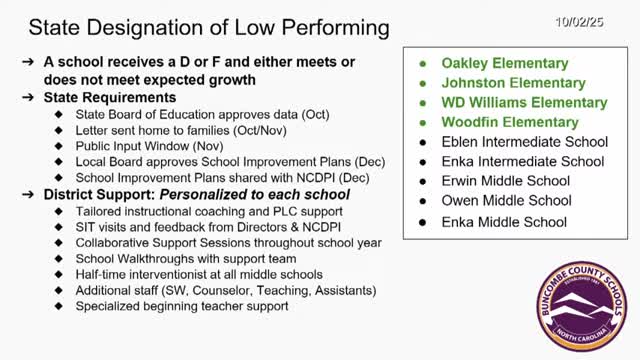Multiple speakers urge board to block Lifewise release-time religious program from replacing class time
October 03, 2025 | Buncombe County Schools, School Districts, North Carolina
This article was created by AI summarizing key points discussed. AI makes mistakes, so for full details and context, please refer to the video of the full meeting. Please report any errors so we can fix them. Report an error »

Multiple members of the public used the board’s public comment period Thursday to press Buncombe County Schools officials to prevent Lifewise Academy programming from replacing classroom instructional time.
Sharon Broussard, a resident who identified her district as Reynolds, told the board Lifewise “pulls public school students out of class during the school day to attend religious lessons” and said the curriculum originates with Lifeway, the Southern Baptist Convention’s publishing arm. “While some kids ride a red bus to Lifewise, classmates left behind often sit idle or do busy work instead of learning,” she said, adding that enrollment jumps when sessions move from lunch/recess into class time.
Nut graf: Commenters framed the issue as one of instructional time, transparency and neutrality. Critics said Lifewise’s funding and incentives are not disclosed publicly, that the program seeks to expand into class periods, and that replacing instruction for some students undermines equity and the district’s academic mission.
Natalie Dorsey, a parent with children at Hominy Valley Elementary and Enka Intermediate, described Lifewise as a “missionary project” rather than an academic program and noted the Supreme Court’s 1952 release‑time precedent does not guarantee a right to interrupt the school day. Dorsey asked the board to consider district policies (citing the district’s strategic goals) and to adopt rules that protect instructional time.
Craig White of the Campaign for Southern Equality recommended that teachers and families catalog classroom book collections to protect diverse representation and to shield teachers from targeted challenges under new state laws on instructional materials. Jeri Nugent, a grandparent, also urged the board to maintain religious neutrality and warned that allowing Lifewise during the school day could create legal and equity risks and invite requests from other groups for equal access.
Board members did not respond during the public comment period; staff noted public comment rules and that the board listens and takes notes. The commenters offered specific requests ranging from policy changes to outright denial of on‑campus release‑time programs during class periods.
Ending: Speakers asked the board to preserve instructional minutes and district neutrality and encouraged the board to consider policy changes before any program expansion into class time.
Sharon Broussard, a resident who identified her district as Reynolds, told the board Lifewise “pulls public school students out of class during the school day to attend religious lessons” and said the curriculum originates with Lifeway, the Southern Baptist Convention’s publishing arm. “While some kids ride a red bus to Lifewise, classmates left behind often sit idle or do busy work instead of learning,” she said, adding that enrollment jumps when sessions move from lunch/recess into class time.
Nut graf: Commenters framed the issue as one of instructional time, transparency and neutrality. Critics said Lifewise’s funding and incentives are not disclosed publicly, that the program seeks to expand into class periods, and that replacing instruction for some students undermines equity and the district’s academic mission.
Natalie Dorsey, a parent with children at Hominy Valley Elementary and Enka Intermediate, described Lifewise as a “missionary project” rather than an academic program and noted the Supreme Court’s 1952 release‑time precedent does not guarantee a right to interrupt the school day. Dorsey asked the board to consider district policies (citing the district’s strategic goals) and to adopt rules that protect instructional time.
Craig White of the Campaign for Southern Equality recommended that teachers and families catalog classroom book collections to protect diverse representation and to shield teachers from targeted challenges under new state laws on instructional materials. Jeri Nugent, a grandparent, also urged the board to maintain religious neutrality and warned that allowing Lifewise during the school day could create legal and equity risks and invite requests from other groups for equal access.
Board members did not respond during the public comment period; staff noted public comment rules and that the board listens and takes notes. The commenters offered specific requests ranging from policy changes to outright denial of on‑campus release‑time programs during class periods.
Ending: Speakers asked the board to preserve instructional minutes and district neutrality and encouraged the board to consider policy changes before any program expansion into class time.
View full meeting
This article is based on a recent meeting—watch the full video and explore the complete transcript for deeper insights into the discussion.
View full meeting
